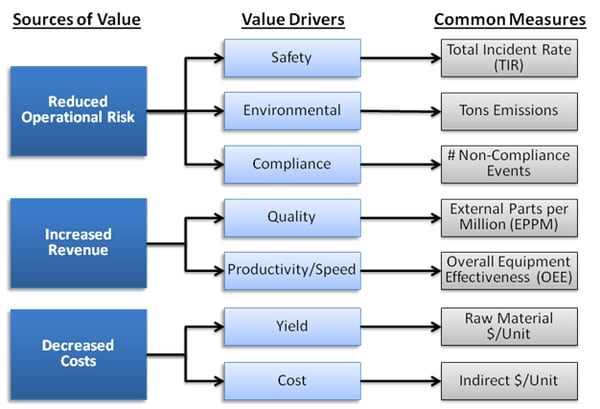The critical first step in achieving Operational Excellence is to understand what the term means using a clear and concise definition. Unfortunately, most firms either completely overlook this step, or dramatically underestimate the difficulty of aligning on a clear and concise definition of Operational Excellence. In our previous post, A Better Definition of Operational Excellence, we put forth the following definition for Operational Excellence:
Operational Excellence is the execution of the business strategy more consistently and reliably than the competition. Operational Excellence is evidenced by results. Given two companies with the same strategy, the Operationally Excellent company will have lower operational risk, lower operating costs, and increased revenues relative to its competitors, which creates value for customers and shareholders.
This definition is more useful than other commonly used definitions because it is actionable and measureable. In a very practical way, we can identify companies that are Operationally Excellent by examining their performance across 7 Value Drivers, and comparing it to other companies with similar strategies.
As the illustration shows, the 3 Sources of Customer and Shareholder Value can be further broken down into the 7 Value Drivers that are commonly measured across industries. Let’s examine each of these Sources of Value and their corresponding Value Drivers.
- Operational Risk: Customers and society expect companies to behave responsibly. They do not want to do business with companies that hurt people, pollute the environment, and violate the law. Companies that cannot do this lose their right to operate, dramatically impacting shareholder value. Companies that are Operationally Excellent are less likely to face Safety, Environmental, and Compliance concerns; lowering the risk of damaging incidents drives shareholder value higher.
- Increased Revenue: Reliable and consistent execution leads to better quality products/services and faster, more reliable, response times. Because customers value having the right quality at the right time, the ability to deliver on those expectations returns value to shareholders in the form of increased revenues.
- Lower Costs: Operationally Excellent companies tend to operate at higher efficiencies and with less waste (higher yield). Likewise, they don’t need to have processes and people in place to manage frequent process breakdowns, allowing them to reduce overhead and other non-value added costs.
Each of the 7 Value Drivers has measurements that are common to an industry. Benchmarking these measures and comparing your company’s performance to those benchmarks gives insight into your progress toward achieving Operational Excellence. Keep in mind that execution impacts performance across all 7 Value Drivers. Therefore, while a strategic advantage may lead to improved performance in a few Value Drivers, Operational Excellence will result in better performance across all seven.
Being able to measure Operational Excellence and identify the companies that have achieved it can be a powerful and valuable exercise for your company. First, it can help you determine the “size of the prize”. Before embarking on an Operational Excellence journey, you need to know what your objective is and what it is worth. Second, knowing which companies have achieved Operational Excellence tells you where to look to for best practices.

